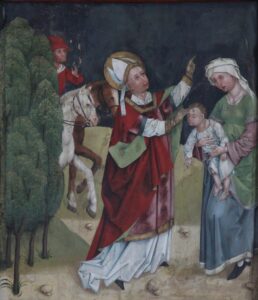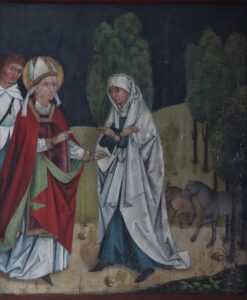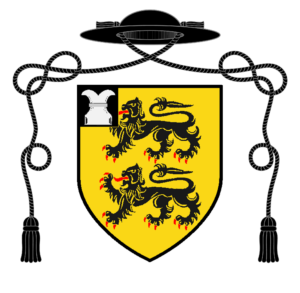The Sacramentals of St. Blaise Day
by Fr. William Rock, FSSP

Many Catholics are no doubt familiar with the blessing of throats performed on the feast of St. Blaise (February 3rd), one of the Fourteen Holy Helpers, who miraculously healed “a boy, whose life was despaired of by the physicians, on account of his having swallowed a bone, which could not be extracted from his throat,” as it is stated in his biography from Matins.1 The blessing involves having blessed candles joined in the shape of a cross held to the throat while the Priest recites the following:
By the intercession of St. Blaise, bishop and martyr, may God deliver you from every malady of the throat, and from every possible mishap; in the Name of the Father, and of the Son, + and of the Holy Spirit. ℟. Amen.2
The use of candles as part of this blessing may have its origin in the following account: “Blaise met a poor woman whose only pig had been snatched up in the fangs of a wolf but at the command of the bishop the wolf restored the pig alive to its owner. The woman did not forget the favor, for later, when the bishop was languishing in prison, she brought him tapers to dispel the darkness and gloom.”3
But this blessing of throats is not the only special sacramental associated with the feast of St. Blaise. To begin with, one might think that these candles used in the throat blessing were blessed the day before, the Feast of Candlemas, but these candles have a unique (and long) blessing of the day applied to them. This blessing is as follows:
℣. Our help is in the name of the Lord.
℟. Who made heaven and earth.
℣. The Lord be with you.
℟. And with your spirit.
Let us pray.
God, almighty and all-mild, by Your Word alone You created the manifold things in the world, and willed that that same Word, by Whom all things were made, take flesh in order to redeem mankind; You Who are great and immeasurable, awesome and praiseworthy, a worker of marvels. Hence in professing his faith in You the glorious martyr and bishop, Blaise, did not fear any manner of torment but gladly accepted the palm of martyrdom. In virtue of which You bestowed on him, among other gifts, the power to heal all ailments of the throat. And now we implore Your majesty that, overlooking our guilt and considering only his merits and intercession, it may please you to bless + and sanctify + and impart Your grace to these candles. Let all men of faith whose necks are touched with them be healed of every malady of the throat, and being restored in health and good spirits let them return thanks to You in Your holy Church, and praise Your glorious name which is blessed forever; through Christ our Lord.
℟. Amen.
The candles are then sprinkled with holy water.4
The reference to Our Lord’s incarnation at the beginning of this blessing has a special significance in this context as the candle is seen as being a sign of the Incarnate Lord. In particular the wax is seen as representing His Body, the wick, His Soul, and the flame, His Divinity.

Lastly, there is the special blessing of bread, wine, water, and fruit in honor of the Saint for the relief of throat ailments. The blessing is as follows:
℣. Our help is in the name of the Lord.
℟. Who made heaven and earth.
℣. The Lord be with you.
℟. And with your spirit.
Let us pray.
God, Savior of the world, Who consecrated this day by the martyrdom of blessed Blaise, granting him among other gifts the power of healing all who are afflicted with ailments of the throat; we humbly appeal to your boundless mercy, begging that these fruits, bread, wine, and water brought by Your devoted people be blessed + and sanctified + by Your goodness. May those who eat and drink these gifts be fully healed of all ailments of the throat and of all maladies of body and soul, through the prayers and merits of St. Blaise, bishop and martyr. We ask this of You Who live and reign, God, forever and ever.
℟. Amen.
The items are then sprinkled with holy water.5
While this blessing is only to be performed on the feast of St. Blaise, the blessed items can be saved and consumed as needed throughout the year.

In addition to receiving the yearly blessing of throats, the faithful, especially those who are prone to ailments of the throat, are also encouraged to take advantage of this unique blessing of bread, wine, water, and fruit. Of course, it is best to coordinate this with one’s priest ahead of time.
Fr. Wiliam Rock, FSSP was ordained in the fall of 2019 and is currently assigned to Regina Caeli Parish in Houston, TX.
In support of the causes of Blessed Maria Cristina, Queen, and Servant of God Francesco II, King
- Guéranger, Prosper. The Liturgical Year, vol. 4 (Septuagesima). Trans. Shepherd, Laurence. (Fitzwilliam: Loreto Publications, 2000), p. 236.
- Latin original Rituale Romanum, Titulus IX – Caput 3, 7; English adopted from the Weller translation of the Roman Ritual provided online by EWTN.
- From the Weller translation of the Roman Ritual provided online by EWTN, “Chapter II: Blessings for Special Days and Feasts of the Church Year, 10.”
- Rituale Romanum, Titulus IX – Caput 3, 7; English adopted from the Weller translation provided online by EWTN.
- Rituale Romanum, Titulus IX – Caput 3, 8; English adopted from the Weller translation provided online by EWTN.
January 29, 2024









